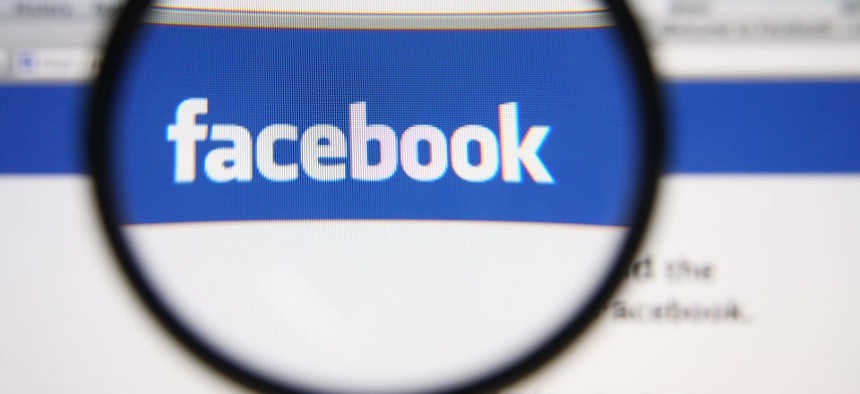Is Facebook Doomed?

Gil C/Shutterstock.com
The social network's future dominance is far from assured.
Facebook has won this round of the Internet.
Steadily, grindingly, it continues to take an ever greater share of our time and attention online. More than 800 million people use the site on an average day. Individuals are dependent on it to keep up not just with their friends but with their families. When a research company looked at how people use their phones, it found that they spend more time on Facebook than they do browsing the entire rest of the Web.
Digital-media companies have grown reliant on Facebook’s powerful distribution capabilities. They are piglets at the sow, squealing amongst their siblings for sustenance, by which I mean readers.
Think about how this weakens the basic idea of a publication. The media bundles known as magazines and newspapers were built around letting advertisers reach an audience. But now virtually all of the audiences are in the same place, and media entities and advertisers alike know how to target them: they go to Facebook, select some options from a drop-down menu—18-to-24-year-old men in Maryland who are college-football fans—and their ads materialize in the feeds of that demographic.
A decade after Facebook emerged from the Ivy League dorms in which it started, it is the most powerful information gatekeeper the world has ever known. It is only slightly hyperbolic to say that Facebook is like all the broadcast-television networks put together. But instead of programming executives choosing what Americans see, programmers are. And while, once upon a time, everyone with a TV and an antenna could see “what was on,” Facebook news feeds are personalized, so no one outside the company actually knows what anyone else is seeing. This opacity would have been impossible to imagine in previous eras.
It is true that a slightly older technology company, Google, also plays a major role in what Americans read on the Internet. Google is an information utility, designed to get people to what they want to know. And when Google was the dominant distribution force on the Web, that fact was reflected in the kinds of content media companies produced—fact-filled, keyword-stuffed posts that Google’s software seemed to prefer.
Facebook is different, though. It measures what is “engaging”—what you (and people you resemble, according to its databases) like, comment on, and share. Then it shows you more things related to that. Like a joke about pizza? You’ll get an article about do-it-yourself brick ovens—and a Domino’s ad. Facebook is constantly showing you more of what it thinks you want to see and click on and read.
This has been the company’s greatest strength. Facebook has built a self-perpetuating optimization machine. It’s as if every time you turned on the TV, your cable box ranked every episode of every show just for you. Or when you went to a bar, only the people you’d been hanging out with regularly showed up.
Adding to the sense of Facebook’s inexorability, any time another company seems to threaten its position in a key domain, Facebook simply buys the business. Take Instagram, which offered a mobile-optimized photo-sharing experience Facebook couldn’t match. So Facebook bought it, for $715 million. Then it scooped up WhatsApp, which had garnered hundreds of millions of users with a simple, solid messaging application. That cost Facebook $21.8 billion.
It’s all enough to make you wonder whether Facebook, unlike AOL or MySpace, really might be forever—or at least as forever as anything American capitalism is capable of producing.
And yet, significantly, people haven’t let go of their unease about Facebook’s core idea. “In three years of research and talking to hundreds of people and everyday users, I don’t think I heard anyone say once, ‘I love Facebook,’ ” says Clive Thompson, the author of Smarter Than You Think: How Technology Is Changing Our Minds for the Better. Like a New Urbanist dream neighborhood where every lamppost and shrub seems unnervingly designed to please you, there’s a soullessness about the place. The software’s primary attributes—its omniscience, its solicitousness—all too easily provoke claustrophobia.
Given the collective unease with Facebook, could the Internet population launch a sort of immune response against the network? Understanding the threat represented by centralizing all of your online identity in one place doesn’t require sophisticated analysis or ethical contemplation. It’s simple stuff: What if Facebook changes something? What if the privacy settings shift (again)? What if you get locked out of your account?
And so, naturally enough, users are spreading themselves around, maintaining Facebook as their social spine, but investing in and loving a wide variety of other social apps. None of them seems likely to supplant Facebook on its own, but taken together, they form a pretty decent network of networks, a dispersed alternative to Facebook life.
This is not a niche phenomenon. Snapchat has more than 100 million monthly users. Line boasts that more than half a billion people message their friends through its service. Pinterest has about 60 million monthly users. Vine has more than 40 million registered users. The list goes on and on.
Social networking is not, it turns out, winner take all. In the past, one might have imagined that switching between Facebook and “some other network” would be difficult, but the smartphone interface makes it easy to be on a dozen networks. All messages come to the same place—the phone’s notifications screen—so what matters is what your friends are doing, not which apps they’re using.
Take a look at the rise of apps that exploit the desire for anonymity, ephemerality, and the unknown—roughly the opposite of Facebook’s founding desire to connect real people (under their real names) on the Internet.
Or take Yik Yak, the most radical of them all. If you’re over the age of 22, you’ve probably never heard of the app, whose sole purpose is to act as a virtual bulletin board for local spaces. People post on anonymous timelines visible to others who are physically close by. The UC Berkeley students who are sitting near me as I write this evidently like posting about classes, drinking, and sex, but mostly they just crack jokes. It’s a zero-commitment app for bullshitting and—maybe—connecting with someone in the physical world. And it regularly ranks among the top free apps for iPhones—below Facebook Messenger but sometimes above even better-known apps like Snapchat and Instagram.Snapchat, which allows its users to send each other self-destructing messages, has grown because people like snapping pictures that won’t go on their permanent record. Anonymous apps like Secret and Whisper allow people to shout things into the ether without worrying that someone will look in on that activity and socially punish them.
Right now, many mobile services merely replicate what people do on their computers. Yik Yak’s entire mechanism depends on where you are. It assumes that you already have ways to contact an extant social network—it takes Facebook for granted, even as it tries to undermine it. And if I were to put money on an area in which Facebook might be unable to dominate in the future, it would be apps that take advantage of physical proximity. Something radically new could arise on that front, whether it’s an evolution of Yik Yak or some service with an even dumber name.
A more direct challenge could come from a change in the media that people use to “talk” with one another. Judith Donath, who founded MIT’s Sociable Media Group and wrote The Social Machine, predicts that text will be a less and less important part of our asynchronous communications mix. Instead, she foresees a “very fluid interface” that would mix text with voice, video, sensor outputs (location, say, or vital signs), and who knows what else. Such an interface could be built by Facebook, but there’s no reason to think it has to be. Indeed, the forthcoming Apple Watch seems like a step toward the future Donath envisions. Users will be able to send animated smiley faces, drawings, voice snippets, and even their live heartbeats, which will be tapped out on the receiver’s wrist.
A simple but rich messaging platform—perhaps with specialized hardware—could replace the omnibus social network for most purposes. “I think we’re shifting in a weird way to one-on-one conversations on social networks and in messaging apps,” says Shani Hilton, the executive editor for news at BuzzFeed, the viral-media site. “People don’t want to perform their lives publicly in the same way that they wanted to five years ago.”
Taken together, these trends pose a direct challenge to Facebook’s supremacy. After all, Facebook is built around a trade-off that it has asked users to make:Give us all your personal information, post all your pictures, tag all your friends, and so on, forever. In return, we’ll optimize your social life. But this output is only as good as the input. And it turns out that, when scaled up, creating this input—making yourself legible enough to the Facebook machine that your posts are deemed “relevant” and worthy of being displayed to your mom and your friends—is exhausting labor.
These new apps, then, are arguments that we can still have an Internet that is weird, and private. That we can still have social networks without the social network. And that we can still have friends on the Internet without “friending” them.
A Brief History of Information Gatekeepers
1871: Western Union controls 90 percent of U.S. telegraph traffic.
1947: 97 percent of the country’s radio stations are affiliated with one of four national networks.
1969: Viewership for the three nightly network newscasts hits an all-time high, with 50 percent of all American homes tuning in.
1997: About half of all American homes with Internet access get it through America Online.
2002: Microsoft Internet Explorer captures 97 percent of the worldwide browser market.
2014: Amazon sells 63 percent of all books bought online—and 40 percent of books overall.
(Image via Gil C/Shutterstock.com)
NEXT STORY: NASA Develops Biodegradable Drones






